Hosting a Charging Station?
WHAT THE NEW (FEDERAL) CLEAN FUEL REGULATIONS MEAN FOR YOU

The new Clean Fuel Regulations, SOR/2022-140, (the “Regulations”) aim to displace the use of fossil fuels and promote the use of electric and hydrogen fuel cell vehicles.
To achieve this, the Regulations set fuel carbon intensity limits for gasoline and diesel, which decrease year by year until 2030 as illustrated in the following table from section 5 of the Regulations:
Fuel Carbon-Intensity Limits
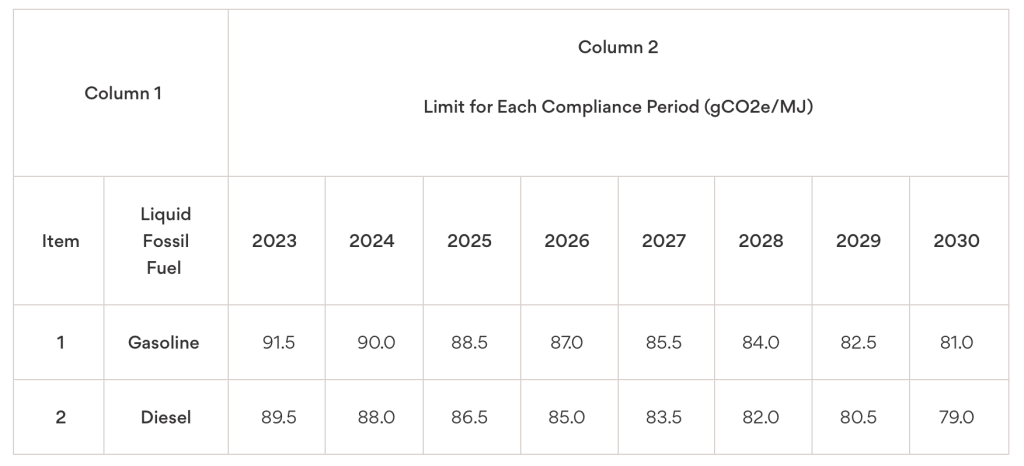
Entities that own, operate, control or manage gasoline and diesel production facilities in Canada, or that import these fuels, are referred to in the Regulations as “primary suppliers” and are subject to the Regulations if they produce or import 400 m3 or more of gasoline or diesel into Canada during a compliance period. To enable primary suppliers to comply with their greenhouse gas emission reduction obligations, the Regulations use the tool of “compliance credits.” A compliance credit is deemed to reduce the amount of CO2e released by the fuel by one metric tonne over its life cycle during the compliance period.
The goal of promoting electric vehicles and the goal of displacing the use of fossil fuels come together in a way: on the one hand, primary suppliers have an interest in acquiring compliance credits to comply with the reduction requirements, and on the other hand, the Regulations allow entities that operate charging stations, which the regulations refer to as a “charging-site host,” to create such compliance credits, which the host may sell to a primary supplier.
Charging-Site Host
The regulation defines a charging-site host as:
charging-site host means a person who owns or leases a charging station and who has the legal right to have the charging station installed. (hôte d’une station de recharge)
And the notion of “charging station” is defined as follows:
charging station means a device that is used in Canada to charge the battery on board an electric vehicle by supplying electricity to the electric vehicle and that is capable of communicating with a server, whether through the Internet or using a cellular signal or connected vehicle communications, to report the quantity of electricity supplied and the time at which it is supplied. (borne de recharge)
Registered Creator and Agreement to Create Compliance Credits
A person who intends to create compliance units must be recognized as a “registered creator” by the Minister.
Note that the registered creator may enter into an agreement to create compliance credits with a person who is carrying out a CO2e emission-reduction project. One way to reduce CO2e emissions is to enter into an agreement to create compliance credits with the charging-site host.
The registered creator can create compliance credits using a quantity of electricity as the energy source. This requires that the electric vehicles fall into one of the categories mentioned in the Specifications for calculating carbon intensity using the Fuel Lifecycle Assessment (LCA) Model Methodology, and in the case where the charging station is not one that is owned by and primarily intended for occupants of a private dwelling or in the case of a public charging station.
Formula
The Regulations provide a formula for determining the number of compliance credits. The formula is quite complex and takes into account the following elements, among others:
- The difference between the so-called baseline carbon intensity for gasoline and diesel and the carbon intensity of the electricity used by electric vehicles;
- The amount of electricity supplied to electric vehicles.
Compliance Unit Transfer Mechanism
Once compliance credits have been created, they can be sold using the compliance-credit transfer system.
Poursuivre la lecture sur le sujet

Energy efficiency: Financial support to put your ideas into action
Leading a company involves balancing several priorities at the same time. Energy efficiency? It’s an important issue—one of many! What if we gave you what you need to make energy efficiency a driving force behind your company’s performance and profitability? The good news is, Hydro-Québec offers financial assistance and guidance to help you balance performance and energy efficiency.
Read more
My Consumption Profile: data that lets you strategically manage your electricity use
Companies have a critical role to play in the energy transition. Knowing that energy efficiency factors big into profitability, your organization will benefit from strategically managing its electricity use. The key? Your data!
Read more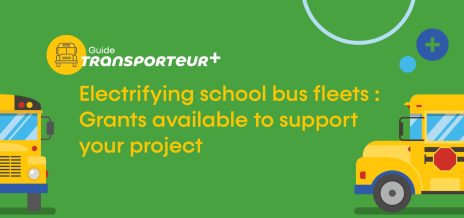
Electrifying school bus fleets : Grants available to support your project
In this series of articles, we demystify the key steps of converting your school bus fleet to electric power thanks to the Transporteur+ guide. This guide aims to provide easy and direct access to resources to clarify the steps, issues, conditions and facilitating measures for a successful transition to electrification.
Read more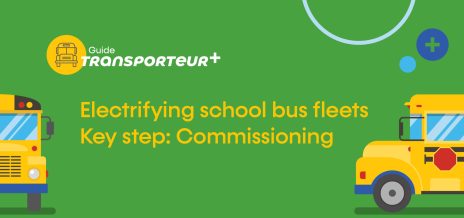
Electrifying school bus fleets | Key step : Comissioning
In this series of articles, we demystify the key steps of converting your school bus fleet to electric power thanks to the Transporteur+ guide. This guide aims to provide easy and direct access to resources to clarify the steps, issues, conditions and facilitating measures for a successful transition to electrification.
Read more
FINANCING | $50 million from Finalta Capital in non-dilutive financing dedicated to the Electric and Smart Transportation sector
Fast growing, innovative companies from the electric and smart transportation (EST) sector in Québec take advantage of the $50 million in funding dedicated to the EST ecosystem by Finalta Capital, one of Canada’s largest funds specialized in non-dilutive tax credit and government grant financing, announced in March 2023 as part of the Impulsion conference, the International EST Summit organized by Propulsion Québec.
Read more
Demand response: Save money by using hydro at the right times
If you could lower your company's hydro bill while contributing to the collective effort to support Quebec’s energy transition, would you? Yes, most likely! How? By curbing power demand for buildings and equipment during peak demand events.
Read more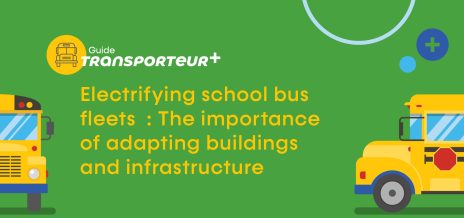
Electrifying school bus fleets : The importance of adapting buildings and infrastructure
In this series of articles, we demystify the key steps of converting your school bus fleet to electric power thanks to the Transporteur+ guide. This guide aims to provide easy and direct access to resources to clarify the steps, issues, conditions and facilitating measures for a successful transition to electrification.
Read more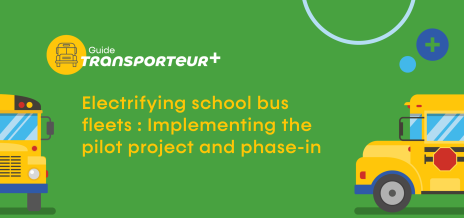
Electrifying school bus fleets : Implementing the pilot project and phase-in
In this series of articles, we demystify the key steps of converting your school bus fleet to electric power thanks to the Transporteur+ guide. This guide aims to provide easy and direct access to resources to clarify the steps, issues, conditions and facilitating measures for a successful transition to electrification
Read more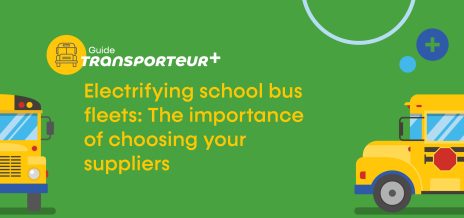
Electrifying school bus fleets: The importance of choosing your suppliers
In this series of articles, we demystify the key steps of converting your school bus fleet to electric power thanks to the Transporteur+ guide. This guide aims to provide easy and direct access to resources to clarify the steps, issues, conditions and facilitating measures for a successful transition to electrification.
Read more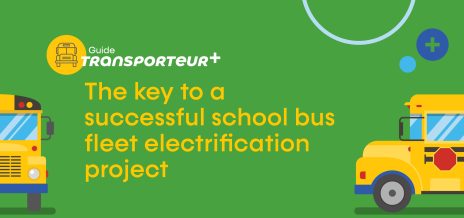
The key to a successful school bus fleet electrification project
In this series of articles, we demystify the key steps of converting your school bus fleet to electric power thanks to the Transporteur+ guide. This guide aims to provide easy and direct access to resources to clarify the steps, issues, conditions and facilitating measures for a successful transition to electrification.
Read more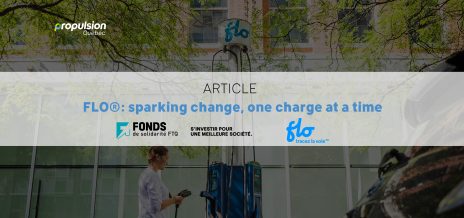
FLO®: sparking change, one charge at a time
FLO became a leader in electric vehicle (EV) charging in North America by integrating the process from start to finish: manufacturing charging stations, developing software and managing its network. To stay ahead of the curve in a fast-moving, innovation-driven market, the company turned to the Fonds de solidarité FTQ to support its growth.
Read more
A TRIBUTE TO THE WOMEN IN OUR ECOSYSTEM – A portrait of the situation in the public domain
For a long time, the transportation sector consisted mostly of men. In the past ten years or so, more and more women can be found around discussion tables, in management roles and on executive boards of different leading corporations and organizations in our ecosystem.
Read more





